The Duke of Edinburgh’s Award (DofE) is a voluntary, non-competitive programme of activities for anyone aged 14-24. Doing their DofE gives young people the opportunity to experience new activities or develop existing skills.
There are three progressive levels of programmes which, when successfully completed, lead to a bronze, silver or gold award. Young people create their own DofE programme by choosing volunteering, physical and skills activities, going on an expedition and, for their gold only, taking part in a residential activity.
Within Scouting, this links directly to the chief scout’s platinum, diamond and Queen’s scout awards. The DofE is delivered through a number of licensed providers, of which The Scout Association is one of the largest in the country. To get involved, please contact any of the Explorer or Network Units listed on the groups page or the District D of E Advisor for more information.
A summary of what is required for the award is given below however for full details, please visit the official website here.
Volunteering
The volunteering section of the DofE is all about making a positive contribution to your community. You can choose to volunteer as a team or an individual and in all kinds of ways.
Your volunteering should ideally be on a weekly basis over the period of months required, this can be 3, 6, 12 or 18 months, dependent on what you have done before and how long you choose to do the other sections for. Weekly involvement should average one hour per week and you should not spend more than a quarter of your time training for your activities.
Physical
The physical section is all about participating in and showing improvement in a physical activity such as a sport, dance or fitness activity. Your physical activity should ideally be on a weekly basis over the period of months required, this can be 3, 6, 12 or 18 months, dependent on what you have done before and how long you choose to do the other sections for. Weekly involvement should average one hour per week and you should not spend more than a quarter of your time training for your activities.
A common problem area for young people is selecting the appropriate activity for the skills and physical sections. The easiest way to make sure you get it right is to think of physical activities as those which require physical effort and make you sweat, and skills as those which don’t.
Skill
The skills section is all about developing practical and social skills and personal interests. Your skill should ideally be on a weekly basis over the period of months required. This can be 3, 6, 12 or 18 months, dependent on what you have done before and how long you choose to do the other sections for. Weekly involvement should average one hour per week and you should not spend more than a quarter of your time training for your activities.
Many of the activities which are done through Scouting are suitable for this section of the DofE programme, try some new activities before deciding what you want to commit to. Within Scouting you may have the opportunity to regularly participate in the following;
- amateur radio
- bushcraft and survival
- canoe building
- casualty simulation
- committee skills
- conservation
- drama and theatre skills
- event planning and organisation
- gliding
- information technology and website development
- marksmanship
- newsletter and magazine production
Expedition
The expedition section requires young people to plan, train for and complete an expedition. The expedition can take place either in the UK or abroad (though processes for gaining approval change), in a suitable type of country to the level (bronze, silver or gold).
The requirements for this section vary depending on the level, each with a longer expedition as the levels progress. The expedition can be completed in a variety of modes of non-motorised travel, ie, canoeing, sailing, walking, cycling, horse riding.
At each level the young people are expected to train for their expedition, having shown suitable competence in the training requirements (as listed on the DofE website) and plan their expedition. There is a requirement at each level to complete at least one unaccompanied practice expedition to show that the group are ready and to gather any learning prior to the qualifying expedition.
Then comes the qualifying expedition:
- Bronze – 2 days and 1 night
- Silver – 3 days and 2 nights
- Gold – 4 days and 3 nights
The qualifying expedition is assessed against the DofE 20 conditions for the expedition section by a DofE accredited expedition assessor.
Residential (Gold Only)
For your Residential section you need to undertake a shared activity or specific course with people you don’t know, in a residential setting away from home and in an unfamiliar environment. Evenings are often as much a part of the experience as daytime activities.
This section offers a high degree of flexibility but it must be done with an organised group, registered charity or Approved Activity Provider. You must join it individually and not with an existing group of friends or as part of a school or youth group trip. You will be staying away – anything from an activity centre or camp to a boat or barge – but you cannot stay with friends or relatives.
There are no age restrictions on who you can do your residential activity with, for example, a conservation project has volunteers of all ages on it – you may even be the only person under 25 or doing your DofE.
Your activity can be anything that provides you with an opportunity for broadening your interests and experiences. It is ideal for trying something new or it can be related to existing interests or activities followed in other sections of your DofE programme.
Use our handy Residential section checklist to make sure your chosen activity will count towards your DofE, and make sure it’s approved by your Leader and Licensed Organisation.




